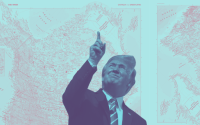Znet
The logic of trade is simple. Suppose I can make wheat better than steel and you can make steel better than wheat. If I then focus on wheat and you focus on steel, we can trade together to exploit our respective talents to each do better than if we didn’t trade. Similarly, if two countries have different "comparative advantage" in the production of wheat and steel, and they each make both wheat and steel for themselves, the total pile of wheat and steel for the two countries will be less than if they specialized. Of course, the extra output from specializing and trading has to exceed the costs of negotiating the trade and sending the items, but if it does, than both sides can get more from trading than not. Free trade, then, is simply trade without taxes, tariffs, or other barriers or restrictions. The logic is that since trade is good in that both parties can benefit relative to not trading, restrictions that reduce trade are bad.
When and why is trade harmful?
First, when two parties specialize and then trade to benefit from comparative advantages, gains could be split to benefit the worst-off party more, divided equally, or benefit the better-off party more depending on prices or what is called "the terms of trade." Some prices could even shuffle all the gains to one side. They could cause one side to be worse off then if they hadn’t traded in the first place, as in many instances of colonialism. So in the short-run, who benefits from trade and how much they benefit depends on prices. One of the ills of international trade is that larger economies can impose prices while smaller economies generally suffer the consequences. This doesn’t only mean that the U.S. and Germany can overwhelm Thailand and Guatemala. Of the 100 largest economies in the world, 52 of them aren’t countries, they are corporations.
Moreover, with no restrictions on international investment, firms will force countries to compete against one another. Every country and community is pressured to lower wages, lower taxes on business, and reduce environmental regulations if they are to attract and hold businesses. This is what has been called the race to the bottom.
Additionally, in this system communities can be decimated if what they have specialized to produce can no longer be sold profitably on the world market. So, for example, if free trade means that U.S. corn has a lower price than Mexican corn, U.S.-made corn will be imported into Mexico and those who produce corn in Mexico may not only lose their land and livelihood, but be forced to leave their communities in search of employment elsewhere.
Or suppose two countries trade and prices are such that both enjoy immediate material gains. However, suppose the division of labor allows one country to develop and diversify its economy, but forces the other country to focus overwhelmingly on one product, perhaps even a product that has no future. One country specializes in coffee or sugar and the other specializes in computer software. As a result, the continual downward pressure on prices of sugar or coffee as well as limited linkage to other industries causes inequality to persist and widen.
Similarly, two countries could trade and one moves in ecologically positive directions, but the other focuses in areas with horrible environmental, labor, or social consequences. Additionally, whether an economic policy benefits only from profits rather than from social quality of life and ecological effects has much to do with domestic agendas in each country. If one country has death squads to silence opposition (paid for by the government of the other country), its labor costs can be pushed to rock bottom, children can be enslaved, toxic waste can be dumped.
Regarding the World Trade Organization (WTO)—its agenda prioritizes the privatization of education, health, welfare, social housing, and transport. According to the U.S. trade delegation, "The United States is of the view that commercial opportunities exist along the entire spectrum of health and social care facilities, including hospitals, outpatient facilities, clinics, nursing homes, assisted living arrangements, and services provided in the home." Salivating in the wings of the WTO talks were U.S. multinationals, including the pharmaceutical industry, the long-term care sector, and HMOs. The WTO seeks to create a new privatization bonanza in the health sector, as but one instance of its overall agenda. Multinational and transnational corporations are lining up to capture the gross domestic product that governments currently spend on public services such as education and health. The long tradition of European welfare states based on solidarity through community risk-pooling and publicly accountable services is being dismantled.
The WTO is an international organization of 134 member countries that is a forum for negotiating international trade agreements and the monitoring and regulating body for enforcing agreements. The WTO was created in 1995, by the passage of the provisions of the "Uruguay Round" of the General Agreement on Tariffs and Trade (GATT). Prior to the Uruguay Round, GATT focused on promoting world trade by pressuring countries to reduce tariffs. But with the creation of the WTO, this corporate-inspired agenda was significantly ratcheted up by targeting so-called "non-tariff barriers to trade"—essentially any national or local protective legislation that might be construed as impacting trade.
The idea is simple—instead of only imposing on third world countries low wages and high pollution due to their weak or bought-off governments, why not weaken all governments and agencies that might defend workers, consumers, or the environment, not only in the third world, but everywhere? Why not remove any efforts to limit trade due to its labor implications, ecology implications, social or cultural implications, or development implications, leaving as the only criteria whether there are immediate, short term profits to be made? If national or local laws impede trade—say an environmental or health law, or a labor law—the WTO adjudicates, and its entirely predictable pro-corporate verdict is binding. The WTO trumps governments and populations on behalf of corporate profits.
Why are people opposed to the WTO?
There is no denying that someone could oppose the WTO out of narrow self-interest—saying, in essence, my country ought to be able to do as it domestically prefers, but other countries should be entirely beholden to this world oversight on behalf of corporations (sort of the way the U.S. government relates to international law and the World Court: it’s for everyone else). But the view of movements against the WTO should be that social, labor, ecology, cultural, and other concerns take precedence over profit-making everywhere, not solely in one’s own neighborhood.
The real debate between WTO advocates and their left critics is not about protectionism, therefore, but about who will be protected from the ravages of unrestrained competition. The WTO has no rules to guard those who labor or to protect long-term development or to foster cultural sustainability or diversity. Without such standards, the majority of people can actually lose from expanding trade, not only relative to a fair ideal, but relative to abstaining entirely.
The critic’s theoretical understanding of the WTO as a vehicle only moved by corporate profit-seeking logic is borne out from the WTO’s history to date. In every case that has been brought to the organization challenging environmental or public safety legislation on behalf of corporations, the corporations have won. When foreign commercial shrimp fishing interests challenged the protection of giant sea turtles in our endangered species act, the turtles didn’t stand a chance. When it was Venezuelan oil interests versus the U.S. Environmental Protection Agency’s air quality standards for imported gasoline, the oil interests won. When it was U.S. cattle producers against the European Union’s ban on hormone-treated beef, European consumers lost. The list goes on.
But don’t we favor regulation of trade?
Yes, but not the type of regulation proposed by the WTO. The WTO is about protecting corporate ownership and monopoly over the patenting of plants, processes, seed varieties, drugs, software, and all capital, fostering its exchanges of goods despite any ill effects, and breaking down any protections of labor, the environment, health and safety, that might limit corporate profit making.
Why do some demand new policies while others demand shutting down the WTO?
Some critics argue that the WTO trade liberalization program is fundamentally flawed and we should abolish this dangerous organization. They urge building global resistance and constructing global solidarity from below. Other people, in particular much of organized labor, argue that while the WTO trade liberalization program is deeply flawed, it’s now well established as a powerful organization and that the concept of negotiated trade regulation is vital to the health and welfare of the world community. They argue that if core labor rights, environmental protections, and what the Europeans refer to as a "social clause" was inserted into the WTO’s mandate and practice, it could be transformed.
What are ten key reasons to oppose or even shut down the WTO?
1. The WTO prioritizes trade and commercial considerations over all other values. WTO rules generally require domestic laws, rules, and regulations designed to further worker, consumer, environmental, health, safety, human rights, animal protection, or other non-profit centered interests to be undertaken in the "least trade restrictive" fashion possible—almost never is trade subordinated to these noncommercial concerns2. The WTO undermines democracy by shrinking the choices available to democratically controlled governments, with violations potentially punished with harsh penalties
3. The WTO actively promotes global trade even at the expense of efforts to promote local economic development and policies that move communities, countries, and regions in the direction of greater self-reliance
4. The WTO forces Third World countries to open their markets to rich multinationals and to abandon efforts to protect infant domestic industries. In agriculture, the opening to foreign imports will catalyze a massive social dislocation of many millions of rural people on a scale that only war approximates
5. The WTO blocks countries from acting in response to potential risk—impeding governments from moving to resolve harms to human health or the environment, much less imposing preventive precautions
6. The WTO establishes international health, environmental, and other standards at a low level through a process called "harmonization." Countries or even states and cities can only exceed these low norms by winning special permission, rarely granted. The WTO thereby promotes a race to the bottom and imposes powerful constraints to keep people there
7. WTO tribunals rule on the "legality" of nations’ laws, but carry out their work behind closed doors. The very few therefore impact the life situations of the many, without even a pretense at participation, cooperation, and democracy
8. The WTO limits governments’ ability to use their purchasing dollars for human rights, environmental, worker rights, and other non-commercial purposes. The WTO requires that governments make purchases based only on quality and cost considerations. Not only must corporations operate with an open eye regarding profits and a blind eye to everything else, so must governments and thus whole populations
9. WTO rules do not allow countries to treat products differently based on how they were produced—irrespective of whether they were made with brutalized child labor, with workers exposed to toxins or with no regard for species protection
10. WTO rules permit and, in some cases, require patents or similar exclusive protections for life forms. In other words, the WTO does whatever it can to promote the interests of huge multinationals—there are no principles at work, only power and greed
What short-term alternatives are there?
The immediate alternative to the WTO is for international cooperation to restrain out-of-control global corporations, capital, and markets by regulating global corporations and markets to make it possible for people in local communities to control their own economic lives. The alternative is to promote trade that:
reduces the threat of financial volatility and meltdown enlarges democracy at every level from the local to the global defends and enriches human rights for all people respects and fosters environmental sustainability worldwide facilitates economic advancement of the most oppressed and exploited groupsRather then the global economy being regulated by small elites in corporate boardrooms, we should have bottom up commissions to restrict trade when it is socially or environmentally detrimental. Further short-term alternatives to the WTO are to:
encourage domestic economic growth and development, not domestic austerity in the interest of export-led growth encourage the major industrial countries to coordinate their economic policies, currency exchange rates, and short-term capital flows in the public interest establish standards for and oversee the regulation of financial institutions by national and international regulatory authorities, encouraging the shift of financial resources from speculation to useful and sustainable development establish a tax on foreign currency transactions— known as a "Tobin tax"—to reduce the volume of destabilizing short-term cross-border financial flows and to provide pools of funds for investment in long-term environmentally and socially sustainable development in poor communities and countries. create public international investment funds to meet human and environmental needs and ensure adequate global demand by channeling funds into sustainable long-term investment develop international institutions to perform functions of monetary regulation that are currently performed inadequately by national central banks, such as a system of internationally coordinated minimum reserve requirements on the consolidated global balance sheets of all financial firms.The alternative to the WTO is to reorient international financial institutions from the imposition of austerity and destructive forms of development to support for labor rights, environmental protection, and rising living standards. The alternative is for wealthy countries to write off the debts of the most impoverished countries and to create a permanent insolvency mechanism for adjusting the debts of highly indebted nations. The alternative is to use regulatory institutions to help establish public control and citizen sovereignty over global corporations and curtail corporate evasion of local, state, and national law, such as establishing a binding Code of Conduct for Transnational Corporations that includes regulation of labor, environmental, investment, and social behavior. The alternative is to renegotiate WTO, NAFTA, and all other agreements regulating international trade to reorient trade and investment to be means to just and sustainable development.
What are the IMF and the World Bank?
In the aftermath of World War II, besides the United Nations, the important international economic organizations created at the conference held at Bretton Woods were the International Monetary Fund (IMF) and the International Bank for Reconstruction and Development (IBRD), now known as the World Bank. The IBRD- World Bank was established to help finance the reconstruction of war-torn Europe and the development of the poorer countries of the world. The IMF mandate was to regulate an international monetary system based on convertible currencies to facilitate global trade while leaving sovereign governments in charge of their own monetary, fiscal, and international investment policies. Significantly, the effort to establish the International Trade Organization (ITO) ended in failure, leaving the "minimalist" General Agreement on Tariffs and Trade (GATT) as its surviving remnant. But all that was more than 50 years ago. The IMF has now become the "point person" for efforts to "liberalize," or deregulate the international economic system.
The IMF has prescribed the same medicine for troubled third world economies for two decades now:
Monetary austerity: Tighten the money supply to raise internal interest rates to whatever heights are needed to stabilize the value of the local currency Fiscal austerity: Increase tax collections and reduce government spending dramatically Privatization: Sell off public enterprises to the private sector Financial liberalization: Remove restrictions on the inflow and outflow of international capital as well as restrictions on what foreign businesses and banks are allowed to buy, own, and operate.Only when governments sign this "structural adjustment agreement" does the IMF agree to lend enough to prevent default on international loans that are about to come due and otherwise would be unpayable. Arrange a restructuring of the country’s debt among private international lenders that includes a pledge of new loans.
What is the effect of the IMF?
The predictable consequences have always been disastrous. Tight monetary policy and skyrocketing interest rates not only stop productive investment, stampeding savings into short-run financial investment instead of long-term productive investment, it keeps many businesses from getting the kind of month-to-month loans needed to continue even ordinary operations. This fosters unemployment and drops in production and therefore income. Fiscal austerity—raising taxes and reducing government spending—further depresses aggregate demand, also leading to reductions in output and increases in unemployment. Likewise, if any of the government spending eliminated was actually improving people’s lives, then reductions in those programs eliminates those benefits. Privatization of public utilities, transport, and banks is always accompanied by layoffs. Whether productivity and efficiency is improved in the long run depends on how badly the public enterprises were run in the first place, and if private operation proves to be an improvement.
One of the most glaring inefficiencies of "structural adjustment," even on its own terms, has been that in its haste to reduce public sector budgets, the IMF has seldom taken the time to try and distinguish between poorly run and well run public enterprises. In its crusade to privatize, the IMF routinely lumps efficient public enterprises together with "white elephants" that do provide poor service to the public while paying bloated salaries to relatives and political supporters of ruling political parties. The IMF never considers the possibility that private replacement might be even worse.
Hasty removal of restrictions on international capital flows makes it easier for wealthy citizens and international investors to get their wealth out of the country, i.e., removal of "capital controls" facilitates capital flight, further reducing productive investment, production, income, and employment. Removing capital controls further exposes the local economy to the vicissitudes of global capital mobility, including the disease of "contagion."
How do we change such important institutions as the global economy?
The same way one wins a new stoplight on a busy street, wins a pay raise, wins an affirmative action law, or ends a war—by raising social costs that the policy makers find so odious and dangerous that they feel they must give in lest the costs climb even higher. What do elites care about even more than they care about these international agencies? Not much—it’s true, but one thing is the overall stability of their material advantage and power. Pursuing WTO agendas is something corporate and political elites want to do, there is no denying that. On the other hand, if doing so polarizes populations into movements that threaten not only these policies but even the underlying requisites of profit-making and governing, that is too high a price to pay. They do not want to awaken a "sleeping giant"—the populations that they govern and exploit.
So we raise social costs by educating a growing public regarding the WTO and other global financial institutions and by channeling the resulting anger and aspirations into social movements that challenge the WTO and local government’s business as usual. What will make these movements most compelling is if they clearly embody the threat to
grow continuously become steadily more militant diversify in focus from the WTO to international trade more broadly, to international relations, and finally to domestic economic policies and arrangements as wellWhat is the relation between capitalism and institutions like the WTO, IMF, and World Bank?
Capitalism is an economic system defined by private ownership of the means of production, corporate workplace structure, and market allocation. These defining features contour much of what can and will happen in capitalist economies. Some implications are: that those who own means of production will accrue vast profits and hold most power; that those who manage and otherwise monopolize daily decision-making will have considerable income and power as well; and that those who only obey orders and carry out labor defined by others will be overwhelmingly subordinate in income and in power. Corporations will dominate economic and social life by creating a virtual dictatorship of the owners and administrators of workplaces, and by corrupting political relations with commercial values and pressures in pursuit of profits. Citizen’s behaviors will be pushed by market competition toward individualist selfishness and outcomes will bias from collective fulfillment toward private profit.
Another mark of capitalism is the market-driven competitive pursuit of profit among capitalists and the use of every means they can muster to defend and enlarge their advantage relative to workers. To further both agendas, various institutions are established. In the international realm these include the WTO, IMF, and World Bank, each a natural outgrowth of the desire of the most powerful capitalists to (a) dominate their own economies without restraint and (b) extend their profit seeking as widely internationally as they are able to, again, without restraint.
What is an alternative to capitalism and markets?
Ultimately, if we don’t like international agencies because they elevate corporate profit over popular well-being, private power over democratic participation, and short-run expediency for the few over long-run fulfillment and sustainability for the many, then we should also reject private ownership, corporate structure, and markets on the exact same grounds.
But what alternatives are there? This is controversial, of course, but an alterntive economy might include things like: remuneration according to effort and sacrifice rather than according to private property, power, or output; jobs balanced for quality of life and empowerment plus workers and consumers council democracy rather than hierarchical corporate structure and authoritarian administration from above; and participatory cooperative social planning rather than individualist, corporatist, competitive market exchange.
Movements for short-run program such as reforming or eliminating the WTO can benefit greatly from orienting their analyses, program, and strategies in tune with longer-run aims. This increases the likelihood of members sustaining hope and commitment; increases the threat that the movement’s growth poses to elites, making it more compelling and powerful; and helps to insure that today’s victories lead to further gains tomorrow and ultimately to a new economy.
Prepared by Michael AlbertCulled from work by Albert, Elaine Bernard, Peter Bohmer, Jeremy Brecher, Dorothy Guellec, Robin Hahnel, Russell Mokhiber, Mark Weisbrot, and Robert Weissman






